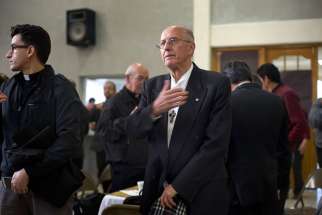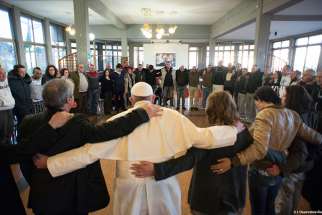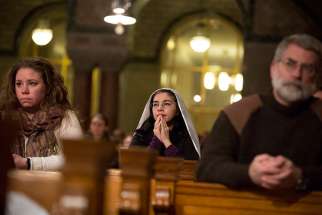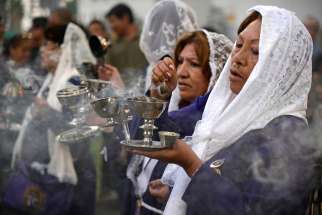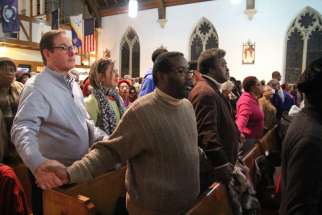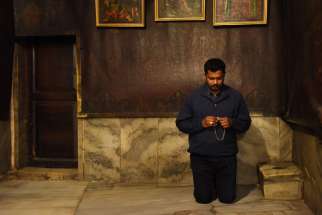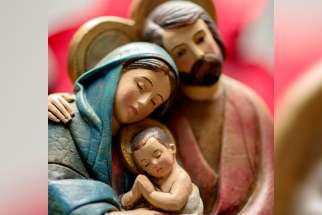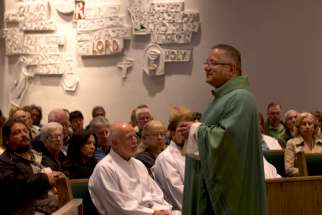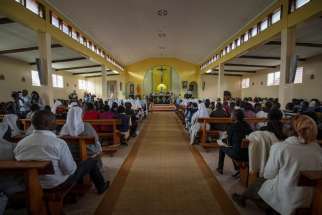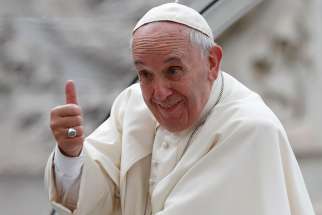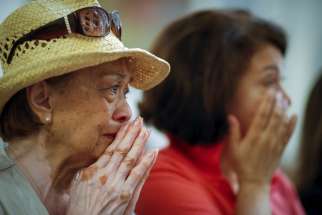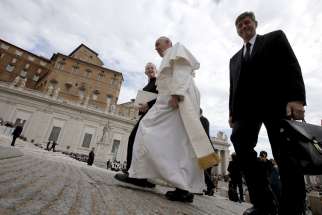Faith: We all share in the power of forgiveness
23rd Sunday in Ordinary Time, Sept. 10 (Year A) Ezekiel 33:7-9; Psalm 95; Romans 13:8-10; Matthew 18:15-20
Sin ultimately affects an entire community. There is no such thing as a private sin. Sooner or later, misdeeds make an impact on the physical, psychological and spiritual environment.
Judgment and condemnation: we are all in need of mercy
Fifth Sunday of Lent (Year C) March 13 (Isaiah 43:16-21; Psalm 126; Philippians 3:8-14; John 8:1-11)
The biblical witness is resounding — God is always compassionate and just, and concerned with the well-being and happiness of humanity. Freedom and redemption are expressions of God, and these qualities never wavered throughout Israel’s history. But in the mid-sixth century B.C., the people of Israel found themselves captives and exiles in Babylon. Jerusalem, along with its temple, had been utterly destroyed. This caused a crisis of faith among many people, and a collective search for the meaning of the disaster. Most blamed themselves for what had happened. Infidelity to God in so many ways could only end badly.
Fear not, for God is mercy
Fourth Sunday of Lent (Year C) March 6 (Joshua 5:9a, 10-12; Psalm 34; 2 Corinthians 5: 17-21; Luke 15:1-3, 11-32)
Liberation is a long and painful process. Being set free from a negative situation is merely the first step in a continuing journey.
God is always faithful, merciful, compassionate
Third Sunday of Lent (Year C) Feb. 28 (Exodus 3:1-8a, 13-15; Psalm 103; 1 Corinthians 10:1-6, 10-12; Luke 13:1-9)
God often appears in the midst of the ordinary and mundane. Moses was only doing what he had done for so long — minding the flocks of his father-in-law. The bush that burned without being consumed was a flash of the transcendent and extraordinary.
Jesus’ followers are expected to journey along the same path
Second Sunday of Lent (Year C) Feb. 21 (Genesis 15:5-12, 17-18; Psalm 27; Philippians 3:17-4:1; Luke 9:28b-36)
Sometimes the future looks bleak and it is difficult to believe in a happy or satisfying outcome. That is the point where many lose hope, and with the departure of hope, faith and love are endangered.
God does the extraordinary through the most ordinary people
Fifth Sunday in Ordinary Time (Year C) Feb. 7 (Isaiah 6:1-2a, 3-8; Psalm 138; 1 Corinthians 15:1-11; Luke 5:1-11)
How would we react if we suddenly found ourselves out of our element and where we had no right to be? Fear, embarrassment and a sense of vulnerability all come to mind — and Isaiah experienced them all. No one could be in God’s presence and live to tell the tale — and there Isaiah was, in the midst of the heavenly court. This was a vision, not an actual physical journey, but no less powerful and frightening.
God’s love is unceasing; we could do likewise
Second Sunday in Ordinary Time (Year C) Jan. 17 (Isaiah 62:1-5; Psalm 96; 1 Corinthians 12:4-11; John 2:1-12)
Not everyone is forgiving or patient in the face of human failure. There is often a tendency to write someone off or dismiss their plight as their own fault. There can even be a smug sense of satisfaction when the “victim” is a prominent figure, especially if there are aspects of that person we do not like.
God blesses us when we undertake to do good
Holy Family of Jesus, Mary and Joseph (Year C) Dec. 27 (1 Samuel 1:20-22, 24-28; Psalm 84; 1 John 3:1-2, 21-24; Luke 2:41-52)
Hannah’s fervent prayer had been answered. During a previous visit to the shrine at Shiloh, she had stood before the shrine and prayed to God for a child. Her murmured prayers earned her an unjust rebuke from Eli the prophet, who accused her of drunkenness. Hannah promised that if God blessed her with a son, she would dedicate him in service to the Lord. Now she fulfilled her promise as she brought her son Samuel — who would grow up to be a great prophet — to Eli for training and instruction.
Jesus shows us the nature of true power
Christ the King (Year B) Nov. 22 (Daniel 7:13-14; Psalm 93; Revelation 1:5-8; John 18:33b-37)
Who hasn’t wished for some supernatural power to come from above and set the world right? In the chaos, fear and violence of our world it often seems that there is no way out. We are faced with numerous crises of every type — political, economic, environmental and religious.
The Lord’s teaching will outlast this world
33rd Sunday in Ordinary Time (Year B) Nov. 15 (Daniel 12:1-3; Psalm 16; Hebrews 10:11-14, 18; Mark 13:24-32)
Many people have been convinced that they were living through the absolute worst time in the history of the world. The carnage and destruction of the First and Second World Wars, as well as the devastation of revolutions, plagues and natural disasters all vie for the top of the list of horrors. It seemed to those who were experiencing these things that the end of the world had indeed come.
God calls on us to forgo power, be a community of equals
32nd Sunday in Ordinary Time (Year B) Nov. 8 (1 Kings 17:10-16; Psalm 146; Hebrews 9:24-28; Mark 12:38-44)
Fear is often the enemy of generosity and can choke off the better parts of our nature. Many people are unwilling to share from fear of not having enough rather than conscious selfishness.
Living the Beatitudes our only hope for a just world
All Saints (Year B) Nov. 1 (Revelation 7:2-4, 9-14; Psalm 24; 1 John 3:1-5; Matthew 5:1-12a)
What are we to make of the Book of Revelation in our own time? It is not a prediction of current events or a preview of the end of the world. It was written during a time of uncertainty and persecution, most likely to give hope and encouragement to struggling and persecuted Christian communities. This particular passage is filled with rich symbols, each one of them conveying an important message about God.
Faith means trusting in God’s goodness
30th Sunday in Ordinary Time (Year B) Oct. 25 ( Jeremiah 31:7-9; Psalm 126; Hebrews 5:1-6; Mark 10:46-52)
The words of this prophecy sound far too joyful and positive to have come from Jeremiah. His prophecies were known for bitterness, lamentation, misery and predictions of doom. This prophecy, on the other hand, is alive with joy and a sense of a bright and happy future for God’s people.
It is the humble servant who is the true disciple
29th Sunday in Ordinary Time (Year B) Oct. 18 (Isaiah 53:10-11; Psalm 33; Hebrews 4:14-16; Mark 10:35-45)
Suffering is bad; it is to be feared and avoided at all costs. This is the heartfelt attitude of most people. Even though this is understandable, it is incomplete. To be sure, needless suffering should be alleviated or avoided. Masochistic self-indulgence has no place in a healthy spirituality. But there is a sort of suffering that has value, and that is suffering borne freely and willingly for the sake of others.
The value of wisdom
28th Sunday in Ordinary Time (Year B) Oct. 11 (Wisdom 7:7-11; Psalm 90; Hebrews 4:12-13; Mark 10:17-30)
You must run for your life in the face of a natural disaster. If you could take only your most precious possession, what would it be? Your car or house? Perhaps your financial portfolio or family heirlooms? The author of Wisdom had definite ideas on the matter, and his answer might be surprising to many. All the precious and valuable things in the world pale in comparison to his prize — the gift of wisdom. He heaped up superlatives singing wisdom’s praises and demonstrating how it is superior to everything else, even power, glory, gold and precious stones.


